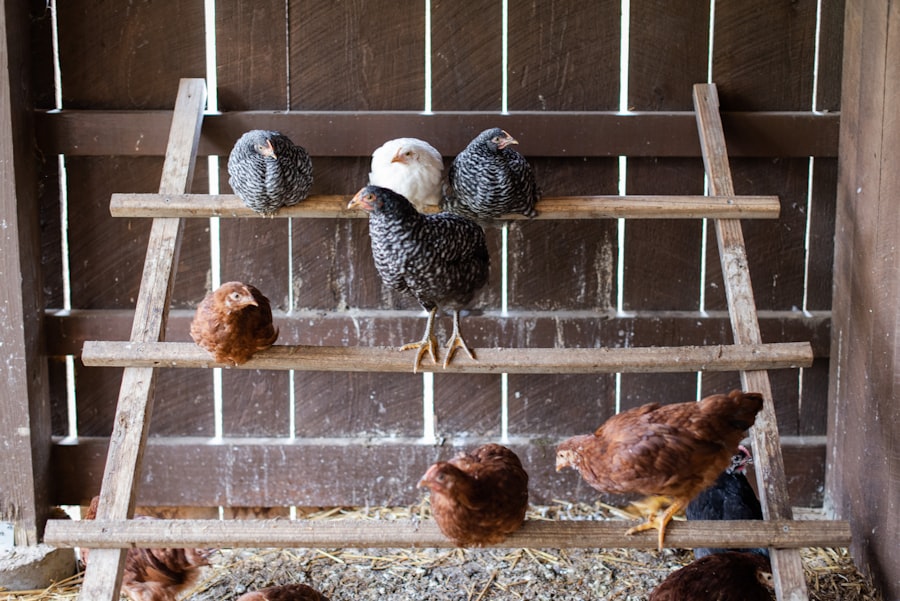Keeping chickens in your yard has become a growing trend in recent years. Many people are drawn to the idea of having fresh eggs right in their own backyard, as well as the benefits of natural pest control and the joy of watching these feathered friends roam around. However, before you jump on the backyard chicken bandwagon, it’s important to know whether it is legal to keep chickens in your yard.
Key Takeaways
- Keeping chickens in your yard can be a rewarding experience.
- Benefits of keeping chickens include fresh eggs, natural pest control, and fertilizer for your garden.
- It’s important to understand local laws and regulations before keeping chickens.
- Choosing the right breed of chickens for your yard depends on your needs and preferences.
- Building a chicken coop requires careful consideration of design, materials, and maintenance.
Benefits of Keeping Chickens in Your Yard
There are numerous benefits to keeping chickens in your yard. One of the most obvious benefits is having a constant supply of fresh eggs. There is nothing quite like gathering eggs from your own flock and knowing exactly where they came from. In addition to the eggs, chickens also provide natural pest control. They love to eat insects and other pests, which can help keep your yard free from unwanted critters.
Another benefit of backyard chicken keeping is the positive impact it can have on the environment. Chickens produce manure, which can be used as a natural fertilizer for your garden. This reduces the need for chemical fertilizers and helps promote healthy soil. Additionally, chickens can help reduce food waste by eating kitchen scraps that would otherwise end up in the trash.
Personal experiences and anecdotes can also shed light on the benefits of keeping chickens in your yard. Many people find that having chickens brings a sense of joy and connection to nature. Watching them scratch around in the dirt and interact with each other can be incredibly therapeutic and calming. Furthermore, chickens can be great pets for children, teaching them responsibility and providing them with a hands-on learning experience about where their food comes from.
Understanding Local Laws and Regulations
Before you start building a chicken coop and bringing home a flock of chickens, it is crucial to research and understand the local laws and regulations regarding backyard chicken keeping. Each city or town may have its own set of rules, so it is important to know what is allowed in your area.
Common restrictions on backyard chicken keeping include noise ordinances and zoning laws. Some areas may have limits on the number of chickens you can keep, while others may require a certain amount of space per chicken. It is also important to consider the proximity of your neighbors and whether they would be affected by the noise or smell of chickens.
To find out the specific laws and regulations in your area, you can start by contacting your local government office or animal control department. They should be able to provide you with the necessary information. Additionally, there are online resources and forums where you can connect with other backyard chicken keepers in your area who can share their experiences and knowledge.
Choosing the Right Breed of Chickens for Your Yard
When it comes to choosing the right breed of chickens for your yard, there are several factors to consider. One of the most important factors is egg-laying ability. If you are primarily interested in having a steady supply of fresh eggs, then you will want to choose a breed that is known for its egg-laying capabilities. Some popular egg-laying breeds include Rhode Island Reds, Leghorns, and Australorps.
Another factor to consider is temperament. Some breeds are known to be more docile and friendly, while others can be more skittish or aggressive. If you have children or plan on interacting with your chickens frequently, it is important to choose a breed that is known for being calm and friendly.
For beginners, it is often recommended to start with beginner-friendly breeds such as Buff Orpingtons or Plymouth Rocks. These breeds are known for being easy to care for and adaptable to different climates. They are also known for their friendly personalities, making them a great choice for families with children.
Building a Chicken Coop: Things to Consider
Building a chicken coop is an essential part of keeping chickens in your yard. A chicken coop provides shelter, protection from predators, and a safe place for your chickens to lay their eggs. When building a chicken coop, there are several factors to consider.
First and foremost, you need to determine the size of the coop based on the number of chickens you plan to keep. The general rule of thumb is to provide at least 4 square feet of space per chicken inside the coop and 10 square feet per chicken in the outdoor run. This will ensure that your chickens have enough space to move around comfortably.
Location is another important factor to consider when building a chicken coop. You will want to choose a location that is well-drained and provides good ventilation. It should also be easily accessible for cleaning and egg collection. Additionally, you will want to consider the proximity to your house and neighbors, as well as any local regulations regarding setbacks or distance from property lines.
Predator-proofing your chicken coop is also crucial. Chickens are vulnerable to predators such as raccoons, foxes, and even neighborhood dogs. Make sure to use sturdy materials and secure all openings to prevent predators from getting in. This includes burying wire mesh around the perimeter of the coop to prevent digging.
Chicken Coop Design: Factors to Keep in Mind

When designing your chicken coop, there are several factors to keep in mind to ensure the health and well-being of your chickens. Ventilation is one of the most important factors. Good ventilation helps remove moisture and ammonia from the coop, which can lead to respiratory issues for your chickens. Make sure to include windows or vents that can be opened and closed as needed.
Lighting is another important factor to consider. Chickens need natural light for their overall health and egg production. Make sure to include windows or skylights in your coop design to allow natural light to enter. You can also supplement with artificial lighting during the winter months when daylight hours are shorter.
Providing enough space for your chickens is crucial for their well-being. Overcrowding can lead to stress, aggression, and the spread of diseases. Make sure to provide enough roosting space and nesting boxes for your chickens. Additionally, consider adding perches and ramps to encourage natural behaviors such as roosting and scratching.
There are many different chicken coop designs to choose from, depending on your needs and preferences. Some popular designs include the traditional A-frame coop, the chicken tractor (a portable coop that can be moved around the yard), and the walk-in coop (which provides more space and easier access for cleaning).
Materials Needed for Building a Chicken Coop
When building a chicken coop, you will need several materials to ensure a sturdy and safe structure. The most common material used for the frame of the coop is lumber. Pressure-treated lumber is often recommended for its durability and resistance to rot. However, if you prefer to avoid chemicals, you can use untreated lumber and protect it with a non-toxic sealant.
Wire mesh is another essential material for building a chicken coop. It is used to cover windows, vents, and openings to prevent predators from getting in. Make sure to choose a wire mesh with small enough openings to keep out predators such as raccoons or rats.
Other materials you may need include roofing materials (such as shingles or metal sheets), hardware (such as screws, nails, and hinges), insulation (if you live in a cold climate), and nesting boxes or roosting bars.
When choosing materials, it is important to prioritize quality and durability. Your chicken coop will be exposed to the elements and needs to withstand wear and tear over time. Investing in high-quality materials will ensure that your coop lasts for years to come.
Steps to Build a Chicken Coop: A Basic Plan
Building a chicken coop can be a fun and rewarding DIY project. Here is a basic plan to help you get started:
1. Measure and mark the dimensions of your coop on the ground.
2. Dig post holes for the corners of the coop and set the posts in concrete.
3. Attach the frame of the coop to the posts using screws or nails.
4. Install the walls and roof of the coop, making sure to leave openings for windows and vents.
5. Cover the windows and vents with wire mesh, securing it with staples or screws.
6. Install the nesting boxes and roosting bars inside the coop.
7. Add a door for easy access to the coop and a ramp for your chickens to enter and exit.
8. Install the roofing materials, making sure to provide adequate protection from rain and snow.
9. Add any finishing touches, such as paint or stain, to protect the wood and enhance the appearance of your coop.
Each step should be done carefully and with attention to detail. It is important to follow safety guidelines and use appropriate tools when building your chicken coop.
Maintaining Your Chicken Coop: Tips and Tricks
Maintaining your chicken coop is essential for the health and well-being of your chickens. Here are some tips and tricks to help you keep your coop clean and healthy:
1. Clean the coop regularly: Remove droppings, soiled bedding, and any leftover food from the coop on a regular basis. This will help prevent the buildup of ammonia and bacteria, which can lead to respiratory issues for your chickens.
2. Provide fresh bedding: Replace soiled bedding with fresh bedding regularly. This will help keep your chickens clean and comfortable.
3. Check for signs of illness: Regularly inspect your chickens for any signs of illness or injury. Look for changes in behavior, loss of appetite, or abnormal droppings. If you notice any signs of illness, consult a veterinarian who specializes in poultry.
4. Protect against pests: Keep an eye out for pests such as mites or lice. Regularly inspect your chickens for any signs of infestation, such as feather loss or red, irritated skin. Treat any infestations promptly to prevent the spread to other chickens.
5. Provide fresh water and feed: Make sure your chickens always have access to fresh water and a balanced diet. Clean and refill their waterers regularly, and provide them with a high-quality chicken feed that meets their nutritional needs.
6. Maintain good ventilation: Check the ventilation in your coop regularly to ensure that it is working properly. Remove any obstructions or debris that may be blocking the airflow.
7. Inspect the coop for damage: Regularly inspect the coop for any signs of damage or wear and tear. Repair or replace any damaged parts to ensure the safety and security of your chickens.
By following these tips and tricks, you can ensure that your chicken coop remains clean and healthy for your flock.
Enjoying the Fruits of Your Labor
Keeping chickens in your yard can be a rewarding and fulfilling experience. Not only do you get to enjoy fresh eggs and natural pest control, but you also get to connect with nature and experience the joy of raising your own flock. However, it is important to do your research and understand the local laws and regulations before embarking on this journey.
By understanding the benefits of keeping chickens, choosing the right breed, building a chicken coop, and maintaining it properly, you can create a safe and comfortable environment for your chickens to thrive. So, go ahead, do your research, gather your materials, and start enjoying the fruits of your labor with a backyard chicken flock of your own!
If you’re considering keeping chickens in your yard, you’ll definitely want to check out this informative article on chicken coop and run plans. It provides detailed instructions and helpful tips for creating a safe and comfortable living space for your feathered friends. Whether you’re a beginner or an experienced chicken keeper, this resource from Poultry Wizard will guide you through the process of building a functional and attractive coop. To learn more, visit https://poultrywizard.com/keeping-chickens/chicken-coop-run-plans/.
FAQs
What are the benefits of keeping chickens in my yard?
Keeping chickens in your yard can provide you with fresh eggs, natural pest control, and fertilizer for your garden. They can also be great pets and provide entertainment.
What are the legal requirements for keeping chickens in my yard?
The legal requirements for keeping chickens in your yard vary depending on your location. Some cities and towns have specific regulations regarding the number of chickens you can keep, the size of your coop, and the distance from neighboring properties. It is important to check with your local government to ensure you are following all regulations.
What do I need to consider before keeping chickens in my yard?
Before keeping chickens in your yard, you need to consider the amount of space you have available, the type of coop you will need, and the amount of time and effort required to care for them. You should also consider the noise and odor that may come with keeping chickens.
What do chickens need to be healthy and happy?
Chickens need access to fresh water, a balanced diet, and a clean and safe living environment. They also need space to roam and exercise, and protection from predators.
What are some common health issues that chickens may face?
Chickens may face health issues such as mites, lice, respiratory infections, and egg-laying problems. It is important to monitor your chickens’ health and seek veterinary care if necessary.
Can I keep roosters with my hens?
Whether or not you can keep roosters with your hens depends on your local regulations and personal preference. Roosters can be noisy and may cause issues with neighbors, but they are necessary for fertilizing eggs and breeding new chicks.
Meet Walter, the feathered-friend fanatic of Florida! Nestled in the sunshine state, Walter struts through life with his feathered companions, clucking his way to happiness. With a coop that’s fancier than a five-star hotel, he’s the Don Juan of the chicken world. When he’s not teaching his hens to do the cha-cha, you’ll find him in a heated debate with his prized rooster, Sir Clucks-a-Lot. Walter’s poultry passion is no yolk; he’s the sunny-side-up guy you never knew you needed in your flock of friends!







